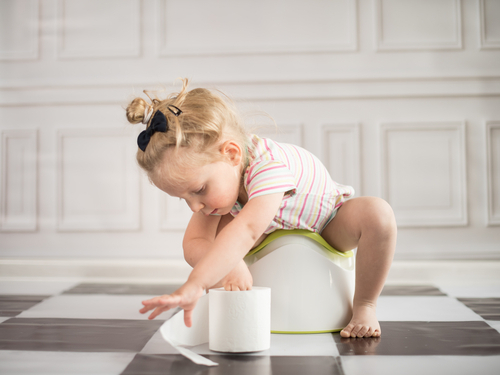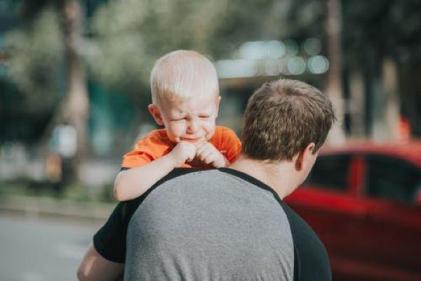
For many parents, toilet training is a big step towards independence for your child. In preparation for sitting on the potty, we look for the signs to see if our child is ready, and we worry about it being the ‘right time’. For some children, it can take a matter of days to start using the toilet; and for others, it can be a very lengthy process. This often depends on your child’s age, their readiness, and determination! Once our little ones are comfortable on the potty or the toilet, the parent or carer can assume that all their learning is complete; however, this is not always the case. A child’s reluctance to poo is a lot more common than we think. I work with many parents where their child may be refusing to poo in the toilet and will only wait until their nappy is back on, if still wearing them. Sometimes a child simply will not go at all, causing problems with tummy aches and constipation.
‘Holding on’
It’s very natural for a parent to worry when their child holds on to their poo for several days or more, particularly if they are not going in their typical pattern. When it continues for a long period of time, it’s often helpful for the parent or carer to reflect and try to understand why this stall has developed. There are many reasons for this change in pattern, and often a child’s toileting has simply regressed because of a change in their lives. For example, if a new baby sibling has joined the family, your toddler may not know how else to deal with such a transition. Some children ‘hold on’ to their poo for fear of it hurting when they eventually do go, and if they have experienced pain on the toilet before, this may be why they are avoiding going altogether. More often than not, holding onto their poo turns into constipation, and their poo may be compacted. For other children, they may have a fear of sitting on the ‘big’ toilet and really not like the after-splash! All of these concerns can be a big deal to a young child, and we can help by talking to and reassuring them. All cases differ from one child to the next, so if you feel the need to go to your GP, do so. In the meantime, it may be helpful to consider the following tips;
Start over
It may seem like a step backwards, but this often works. Encourage your child to use the bathroom as the space to go to the toilet, as often children will seek a quiet spot - particularly if they are in their nappy, but to start new habits. Define the toileting space, and encourage the bathroom as a positive association to toileting, even if using a potty. Be prepared to spend a lot to time in here, too!
Keep track of your child’s pattern
The more familiar we are with our child’s toilet routine, particularly for the poos, the better chance we have at encouraging them to try going at those times instead of always asking them. Some children avoid pooing in public toilets; acknowledge that this is OK, but always encourage it at home.
Avoid keeping to a time frame
Go at your child’s pace as best you can – adults often have a time limit or a goal and are under pressure to complete toilet trips in a timely manner; however, this can often put unnecessary pressure on everyone. Stay patient and positive - the less pressure for your child, the better.

Encourage a diet of fibre and fluids
If your child is constipated, try to introduce some high-fibre foods to naturally soften their stool. For example, fresh and dried fruits - like prunes, wholemeal bread, rice and pasta, nuts, beans and baked potatoes. Also, encourage them to drink plenty of water. Dr. Eleanor Galvin from the Family Doctors clinic in Rathfarnham recommends a small amount of lactulose, which is a medication for constipation available over the counter.
But if these simple measures don’t work, you could consider taking your child to a GP. Dr. Galvin says that “often no huge investigation is needed. Constipation usually has no underlying cause and a doctor can tell if a child is constipated by examining their abdomen”. Dr. Galvin also shares that “some children have ongoing problems with constipation on and off, and need ongoing diet changes with more fibre and sometimes medication however they generally grow out of it”.
Empathise
For the majority of children who are toilet training, they are at the age where they can understand and follow instructions; they can identify and name the basic feelings. The key at this point is to encourage the child to try their best, acknowledge feelings of fear and discomfort; empathise if they are feeling upset, frustrated or physically uncomfortable and remind them that you are there to help them.
Reinforce best efforts, but not just for the toilet
Although we want to praise how well our children are doing, even if it is sitting on the toilet for a short period of time, we don’t want it to be the only focus. If a child senses that toileting becomes the main concern, that pressure can often hold up proceedings! Notice how well they are doing in their playing with others, helping at home, sleeping at night, eating their meals – this all takes from the obvious issue.
Avoid negative consequences to soiling or any accidents, keep a positive mind set, our children can be very tuned in to how we are feeling too!
Feeling good
Create opportunities where your child experiences other ‘feel good’ achievements, not only reward their best efforts of doing a poo. Whether it’s using a star chart or token jar, focus on other areas that make them proud - building confidence is a great way for our children to feel that they can achieve anything including their toileting.
Talk to your GP or PHN if your child is in pain or is resisting going to the toilet. If necessary, your GP can refer them to a paediatrician or child psychologist. Follow the medical advice, as well as your parent instincts, and provide support to your child at home.
Recommended reading
Reading story- themed books can reassure your child and help them with their potty training. Here are some titles that I recommend:
‘It Hurts When I Poop’ by Howard J Bennett
’I Can’t, I Won’t, No Way! A Book for Children Who Refuse to Poop’ by Tracey J Vessillo
‘Everyone Poops’ by Taro Gomi
Aoife Lee, Parent Coach for Giraffe Childcare






